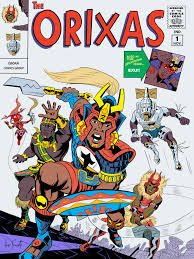About This Club
The Black Speculative Fiction Club is for those who read, create and enjoy science fiction, fantasy, paranormal, horror and afrofuturism books created by and about Black people of African and the African Diaspora
- What's new in this club
-
E.Breezy joined the club
-
Toni Colley-Lee joined the club
-
The Black Magician joined the club
-
Ced Pharaoh NKOSI MEDIA joined the club
-
themick2008 joined the club
-
cool
-
What is Cyberfunk? It is a vision of the future with an Afrocentric flavor. It is the Singularity without the Eurocentric foundation. It's Bladerunner with sunlight, Neuromancer with melanin, cybernetics with rhythm. Nineteen amazing Black Speculative Fiction authors have come together to share their visions on the pages of this book. Prepare to be mesmerized by their stories. Featuring stories by Eugen Bacon, Zig Zag Clayborne, Gerald L. Coleman, Ashleigh Davenport, Milton J. Davis, Minister Faust, Donovan Hall, John Jennings, Ronald Jones, Nicole Givens Kurtz, Kyoko M, Carole McDonnell, Violette Meier, T.C. Morgan, Balogun Ojetade, Hannibal Tabu, Jarla Tangh, Napoleon Wells, and K. Ceres Wright. Cyberfunk! ISBN-13 : 978-1734627985
- 1 reply
-
- 1
-

-
no need for apologies
-

One more time!
richardmurray replied to Milton's topic in Black Speculative Fiction Book Club's Topics
cool -
richardmurray joined the club
-
Hello everyone! Hope you're still here. Going to jumpstart things next month and keep them going. Stay tune for new topics, author interviews and other good stuff related to Black Speculative Fiction!
-
Sorry for the long hiatus. Things have been busy, but we're ready to get this party re-started. Stay tuned for new member and new topics.
-
Stefan joined the club
-
MissKorang joined the club
-
I absolutely agree. "The Struggle" didn't always exist. There was a time when there was no such thing. That time could come again at any moment. To me the struggle now is to see ourselves living in a world where justice prevails relentlessly. To paraphrase Dr. King: "Justice everywhere is a threat to injustice anywhere."
-
Yes! I know of "Aunt Nancy" (Anansi - west african origin) from the research I did for my novel. In fact, that's how I found about many of the African Gods/Goddesses. Funny thing is Western civilization would have us to believe that there's only gods/goddess from North Africa - so we ignore or not realize the greek & roman gods were just ripoffs of the indigenous deities. But for every god/goddess the West claims - there is the original from the motherland. I don't think it's disputed but like in the book and TVshow of the same name "American Gods, " the gods disappear when their people stop believing. So, sadly, colonization left us with jesus while the conquerors took and renamed the African god/ess. But early on, I think it was just translation not theft that turned Shango into Thor. For example, Shango would have been prevalent in the Viking world - because of rough traveling on stormy seas. Recent reports like the one highlighted in the NY Times https://www.nytimes.com/2020/09/16/science/vikings-DNA.html indicate that the Vikings - weren't all nordic as previously thought but were made up of several ethnic groups. So, trading stories about weather gods probably helped calm the sailors.
-
Not really but Spidey in the comics is a smart aleck. @Nnamdi Azikiwethe style is similar without the lines that Kirby drew. I wasn't found of Kirby for that very reason. Also do you know the name of that piece of sculpture on the book cover? Season two of American Gods really showcased the Ananzi and the Black Gods, then he was removed from the story.
-
I don't know that. I know Anansi was in American Gods. I know Hulk is the Jewish golem. Iron Man was a European myth. The Fantastic Four are Earth Wind Fire and Water (The Thing, Invisible Girl, The Human Torch and Mr. Fantastic) of course Thor is the Nordic/Viking God. I do know Hugo Canuto did something special with the Tales of the Orixas. I'll never get over how close he emulates Jack Kirby's style. https://hugocanuto.com/gallery/contos-dos-orixas-tales-of-the-orishas/ Joseph Campbell tried to redeem himself at the end and take back his claim that there was only one story...being told by everyone except people in Africa. I was really annoyed by that. Apparently I was not the only one. Clyde Ford put the issue to rest with The Hero with An African Face. https://aalbc.com/books/bookinfo.php?isbn13=9780553378689
-
Maybe it was. In fact, I might have subconsciously been motivated by my disappointment in Stan to write what I call Keyamsha the Awakening for that same reason. We live in a world of infinite possibilities of which we are living only one. In a parallel universe I might have tracked down Stan before he ventured into the great beyond and put some of this to him so we can get a definitive answer. Or maybe the answer lies somewhere in a book we haven't explored yet. It is kind of hard to let ol' Stan off the hook knowing that in 1960 appeared an English language version of a story by Michael Verne attributed to his father Jules with a bit more than a passing similarity to the idea of Wakanda...except with Tarzan framed characters added in for good measure. Of course Verne was a compatriot of the notorious Felix Dubois, the first Europen to enter Timbuktu. The 1960 publication of City in the Sahara/The Barsac Mission puts us back in the Silver Age of Marvel, in Africa with high technology isolated from the rest of Africa. Possibilities. https://www.google.com/books/edition/The_City_in_the_Sahara/jYwd1jgmSKkC?hl=en&gbpv=1&dq=city+in+the+sahara+jules+verne&printsec=frontcover You just described the theme of Stephen King's "On Writing." He didn't know he was going to write Carrie until he wrote it. Then he threw it in the trash. His wife found it and made him finish it. Carrie might have been struggling, but the struggle wasn't King's own. It was a composite of several people culminating in a coming of age story that many people relate to. We want Carrie to win because King made us care about her and her struggle became ours. For instance instead of racism, what about the emotions it produces. Make it something unconnected to it but sparking the same emotions. Rod Serling tried going away from Emmett Till in "A Town Has Turned To Dust." He got the same effect, emotionally, but was dissatisfied with the story. "Noon on Doomsday" was supposed to be his retelling of Emmett Till but the sponsors didn't go for it.
-
What if that was the point? What if Stan Lee made Wakanda separate for that very reason. In hopes, someone like you to come along and raise this point. Our content, our literature, always ask a question. This is what makes literature (comic books included) the best conceptual teacher! So, for example, you come to the aalbc community and teach / remind us about the Berlin conference - and now we are able to build our knowledge with that piece of the puzzle. One thing I learned after publishing my debut novel and gathering intel on my readers is that comic book aficionados are a “rare intelligent breed.” Stan Lee knew his audience and subconscious or not - if you want to keep a secret, hide it in a book. So, maybe Wakanda was a wink and a nod conversation starter. As you’ll see here in this forum - there are facts, perception and perspective and they rarely meet. But I do like conversations that help me understand the world a bit better. I like the short film that led to Raising Dion - better than Netflix’s version. The short was a true allegory of how to raise a black boy in a world that wants to steal his power. I have a hard time with Thor. I’m still mad at that one @Delano because Thor is a ripoff of “T'shango, the Yoruba god of lightning & thunder. He is a warrior god and wielded a wicked hammer and thunderstones according to legend.
-
To me Black Panther represents the idea of the Berlin Conference...divide and conquer/rule. Prior to the Berlin Conference Africans did not have boundaries like there are now. One of the things that I really see as fundamental to really understanding Pre-Berlin Conference Africa is what some people call "The African Ink Road." From north of Timbuktu to south of Kaduna in what is present-day Nigeria was a trading route memorialized with the proverb/slogan "Gold comes from the south. Salt comes from the North. But knowledge and beautiful things come from Timbuktu." Black Panther really is ahistorical...here is Wakanda, the only African country with all this fantastical technological ability. Meanwhile, it pays not attention to apartheid? Doesn't lend a hand during to the Mau Mau? Is completely indifferent to Cecil Rhodes' intention to colonize everything "From the Cape to Cairo?" What made Wakanda ignore the fact all it's neighbors except Ethiopia and Liberia were colonized up until Ghana's independence? Here's the kicker for me. The Biafran War took place during the Sliver Age of Marvel Comics. Wakanda ignored it. I know comics are not the real world, but this is a fantasy world that defies reality in too many ways to be ignored. So what made Wakanda separate itself from the rest of the continent? Stan Lee. Dr. Welsing made me look at how the subconscious speaks loud and clear when we look at motivations. Just like Edgar Rice Burroughs, and James Patterson, Lee's version of Africa is HIS view. T'challa is who Stan Lee would be in Africa if he had the opportunity. The movie does the same thing. The African diaspora becomes the enemy through Killmonger. The CIA/USA becomes the (shadow) hero/ally through Ross. Don't get me wrong. I LOVE Stan Lee. Love Jack Kirby. Wanted to be a mix of Jim Starlin, Gil Kane, and Kirby with Big John Buscema and Frank Frazetta sprinkled on top growing up. That whole "What Kinda" thing sank my battle ship. Thanks for questioning the Melanin Envy angle @Delano. Who knows this might turn into a book. "Psychoanalyzing Wakanda." I'm a "late adopter" because of Microsoft's tendency to release software before it's time. Nothing ever lives up to it's propaganda.
-
I still haven't. When the masses talk about a project their chatter influences the vibration. So, I'm still waiting for all of the hoopla to die down. I've recently seen Hamilton. I was able to experience the hype for myself. And beside the rhyming, the hype IS the rhythm and the drums, so to speak. I appreciate the influence Chadwick Boseman had on Black Panther. In his passing, those connected with the film are sharing the backstories. I think this is what makes the movie uniquely African, and African American. So. even without seeing it, I get now why Black Panther connected on soul level with so many African ascendants around the world.
-
Not certain how I Black Panther is a Black faced White Man that isn't from Africa yet can talk to the animals and the locals are afraid. Oddly Black Panther wasn't one of my favourites. I was into Mythology so I liked Thor. Luke Cage aka Powerman is way more problematic for me than Black Panther. In his debut he beat the Fantastic Four. A Genius, master Tactician and King of a self sufficient Nation. But I am biased I enjoyed most of the Marvel movies except the Fantastic Four. On another note I also found travelling opened my mind to America and my place in it. Which African Authors di you have in mind?
-
Neither have I. Black Panther is not our story by the way. It was one of my favorite comic books until the time came when I couldn't resolve how "Wakanda" seemed so odd as a name. Latveria where Dr. Doom is from seemed like a reasonable form of a country name from Europe. When I kept stumbling over the word until wondering "what kind of..." Then I fell out of love with comic books. Briefly revisited them when I started reading again. To me Black Panther is Tarzan in Blackface/Melanin Mimicry. Just the idea you would have a country like that not only cut off from the rest of Africa, but T'challa being able to have relationships outside Africa without any within pretty much says it all.
-
Some African authors are free of external influence. 2000 Seasons was the first time I ever imagined the possibility. The story begins before the Arabs arrived in Africa. I literally remember being surprised people from outside the continent were missing from the story until that point. After reading "The Palm Wine Drinkard" it became reality. A totally different world view. Struggled with my screenplay/book Keyamsha the Awakening until I went to Nigeria. That year, 1999, the movie of the year in Nigeria was "Egodo." A fantastic story. It showed me possibilities of a worldview starting from the inside out. Now a central point of Keyamsha the Awakening is the main charater leaving this world to visit another and return transformed with an expanded perspective. Sovereignty. After that I began to view things in an almost inverse way. I started to realize something. Prior to immersion in the educational system I had this sense of "connectedness." Public school took that away and replaced it with self as other. Its like most people don't realize in the USA it's as if someone is looking over our shoulder all the time. This invisible scorekeeper working to disconnect us from the rest of the world. I hear it in the words people use and don't use. Ideas people never consider. Now it might seem like I set out to go to extremes to make the view from which I speak my own. I don't think Mario Puzo had to struggle with telling the story of Vito Corleone as it is his own. I don't intend to struggle with having my own voice either.
-
Nnamdi Azikiwe joined the club
-
Jaws R. joined the club
-
@Troy OMG! Yes, most stories written by black authors aren't free of another ethnic group's influence. This is why I don't read most black books and rarely watch black dramas. And no, I haven't seen Black Panther - but I did watch Netflix's "Raising Dion." Some parts were "laugh out loud," and I did appreciate the message. But mostly, in either medium, we as an ethnic group are reactionary instead of responsive to our environment. When I read, I look for someone I can relate to in the pages or screen. My personal struggles rarely, if ever, have to do with racism. Although I subscribe to "intersectional feminism" beliefs, it hasn't been my struggle either. In fact, being a black woman has afforded me more opportunities than if I were a regular white man. So when I read or watch thrillers, mysteries, horror, sci-fi - it's usually written by a white man. Although I've recently found Film producer Ben Watkins, Victor Lavalle, two men who identify as black, which both speak to me on several levels.both speak to me on several levels. I think because they both write strong ass, black women, with an agency in their films and stories. I'm also looking forward to reading N.K. Jemisin. But I digress, white men have different struggles but struggles that most black people face in addition to racism, misogyny, sexism, etc... So, I read them to learn how to solve conflicts that exist outside of the "ism" schism. So yes, please battle other conflicts that are also pertinent to our existence on this big blue marble. We've spent 400 years fighting racism... I'm not sure I want to escape into a book that also battles it too.

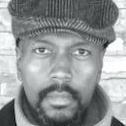
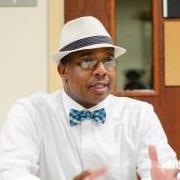
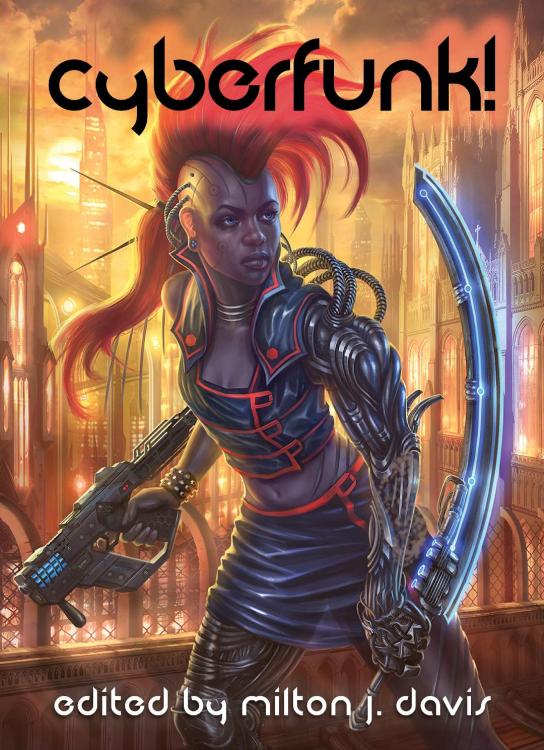
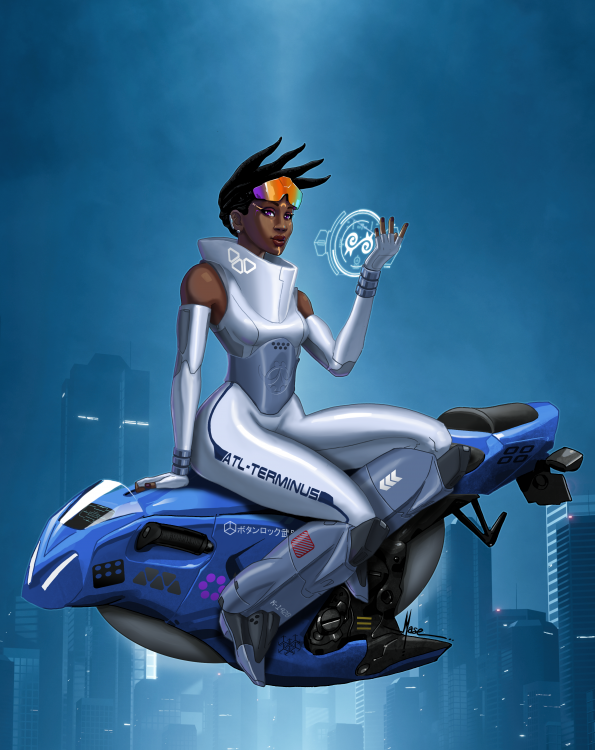
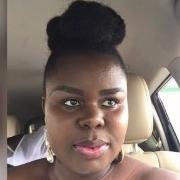
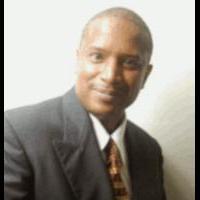
.thumb.jpg.afc88dfee9cd2927de0c440601caac13.jpg)

